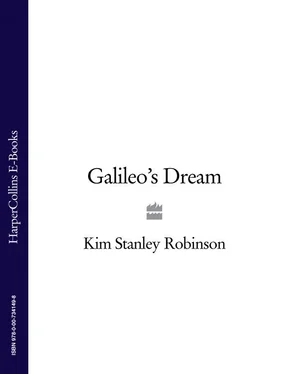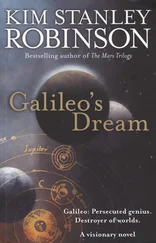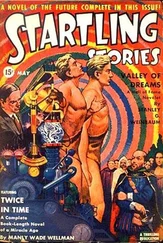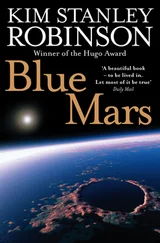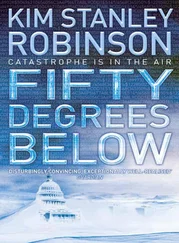‘So you say, maestro.’
They manufactured a lot of spyglasses. Making the objective lenses bigger and smoother, while keeping the eyepiece lenses at their original size and grinding them both deeper and smoother, led to very satisfactory jumps in magnifying power. In a matter of weeks they had glasses that showed things twenty-twenty-five- thirty-finally thirty-two times closer than the unaided eye saw them. There they hit their limit; the lenses could not be made bigger or smoother, and the tubes were twice as long as when they had begun. Also, as magnifying power grew, what one actually saw through the glass contracted down to a very small field of view. One could move one’s eye around the eyepiece a bit to broaden the view, but not by very much. Accurate aiming was important, and Galileo got better at this by attaching an empty spotting tube to the side of the strongest glass. They also had to deal with a white glare that invaded the sides of the larger images, where the irregularities in the lenses also tended to cluster, so that the outer circumference of the image was often nearly useless. Here Galileo put to use a solution he had discovered to deal with the rainbow rings that plagued his own vision, especially of things seen at night. This unhappy phenomenon he tended to attribute to the strange incident of his near-death experience in the cellar of the Villa Costozza, which he also believed had caused his rheumatism, bad digestion, headaches, seizures, melancholia, hypochondria, and so on. Vision problems were only one more remnant of that ancient disaster, and he had long since discovered that if he looked at something through his fist, the aurora of coloured light surrounding the thing would be blocked from view. Now he tried the same remedy with the new spyglasses, fashioning with Mazzoleni’s help a cardboard sleeve that could be fitted over the objective. The most effective one left an oval opening over the lens that blocked most of the outer third of its area. Why an oval worked better than a circle he had no idea, but it did; the glare was eliminated, and the image that remained was about as large as before, and very much sharper.
As the spyglasses got stronger, things in the sky were becoming visible that had not been visible before. One night, after a long inspection of the moon, he swung the glass across the sky toward the Pleiades, just risen above the house. He looked into the glass.
‘My God,’ he said, and felt his body ringing. Around the Seven Sisters were scores of stars. The familiar seven stars of the gorgeous little constellation were brighter than the rest, but surrounding them were thickets of lesser stars, granulated almost to white dust in places. The sense of enormous depth in the little black circle was palpable, almost vertiginous; he swayed a little on his stool, mouth hanging open. Even the spectacle of the mountainous moon had not prepared him for such a thing. No one else in the history of the world had ever seen these stars, until this very night, this very moment. It was the oddest feeling in the world. He sketched a quick map of the newly crowded group, making the familiar sisters little sixpointed stars like a child would draw, with the new stars tiny crosses-the drawing done almost unconsciously, a kind of nervous habit, deeply engrained after so many years of exercising it. Until he sketched something down his hand would itch with the urge.
He looked until his eyes hurt, and the points of light swam in the eyepiece like gnats in the sun. He was cold, almost shivering, his bad back like a rusty hinge inside him. He felt that he would sleep the moment he lay down: a luscious feeling for a lifelong insomniac, he bathed in it as he stumbled off to bed.
His empty bed. No Marina. He had kicked her out, and life was ever so much more peaceful. Nevertheless he felt a quick stab of regret as he dived into the deep pool of sleep. It would have been nice to have someone to tell. Well-he would tell the world. The thought almost woke him.
Only six days after his demonstration to the Venetian Senate, his reward came, in the form of a new contract offer. Procurator Antonio Prioli, one of the heads of the university in Padua, came out of the Sala delle Senato to take Galileo by the hand. ‘The Senate, knowing the way you have served Venice for seventeen years, and sensible of your courtesy in offering your occhialino as a present to the Republic, has ordered your election to the Professorship for life, if you are willing, with a salary of a thousand florins a year.’ He raised his other hand: ‘They are aware that there remains a year on your current contract, and yet want the increase in salary to begin this very day.’
‘Please convey to His Serenity and all the pregadi my deepest thanks for this most kind and generous offer, Your Honour,’ Galileo said. ‘I kiss their hands, and accept with the utmost gratitude.’
‘Shit,’ he said the moment he was out of earshot. And back home he started cursing in a way that emptied the rooms well before he stormed through them. ‘Shit shit shit. Those pricks! Those cheap bastards, those soddomitecci !’
He remembered as he always did that Cremonini, an old duffer Galileo had enjoyed sparring with through the years, already made a thousand florins a year from the Venetian Senate. That was the difference between the standing of philosophy and mathematics in this world, an inverse ratio to justice, as so often happened: the worst philosopher had been paid twice the best mathematician.
Then also, a salary fixed in perpetuity meant there would never be another raise, and Galileo already knew to the last quattrini his expenses, which were such that this raise would only just cover them, leaving him still unable to pay off his sister’s dowry and his other outstanding debts.
Also, the salary was a salary, paid for his teaching, as before-meaning there would be no time to write up his experiments, or make new ones. All that work in the notebooks in the workshop would continue to lie there mouldering.
So this was not exactly the most exciting result one could have imagined, given the extraordinary power of his new device, and its strategic importance, obvious to everyone who had witnessed the demonstration. The triumph of that day had had Galileo imagining a lifetime sinecure, all his debts and expenses paid, and afterward free from all work except research and consultation, which he would have applied most faithfully to the good fortune of La Serenissima. They would have benefited greatly; and in any duchy or principality or kingdom this kind of patronage would not have been unusual. But Venice was a republic, and courtly patronage as it was practised in Florence or Rome, or almost anywhere else in Europe, did not exist here. Gentlemen of the Republic worked for the Republic, and were paid accordingly. It was an admirable thing, if you could afford it.
‘Shit,’ he repeated weakly, staring at his workshop table. ‘Those cheap bastards.’ But a part of his mind was already calculating what the thousand florins a year would do to meet expenses and knock off debts.
Then he heard in a letter from Sarpi that some of the Senators had complained to the body at large that the spyglass was a commonplace in Holland and elsewhere in northern Europe, so that it had not really been Galileo’s achievement, and he had presented his device under false pretences.
‘I never said I invented the idea!’ Galileo protested. ‘I only said I made it much better, which I did! Tell those cheap bastards to find a spyglass as good as mine somewhere else if they think they can!’ He ripped off a long letter that he sent to Sarpi to give to the senators:
News arrived at Venice, where I happened to be at the moment, that a Dutchman had a glass looking through which one could see distant things as clearly as if they were near. With this simple fact I returned to Padua, and pondering on the problem, I found the solution on the first night home, and the next day I made an instrument and reported the fact to my friends at Venice. I made a more perfect instrument, with which I returned to Venice, and showed it to the wonder and astonishment of the illustrati of the Republic-a task which caused me no small fatigue.
Читать дальше
